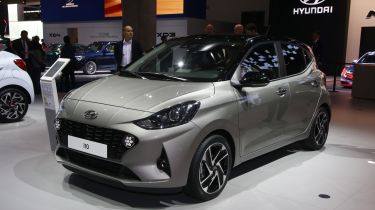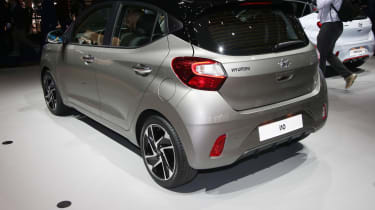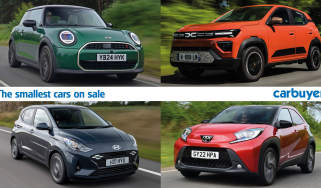New 2020 Hyundai i10: prices, specs and release date
Third-generation Hyundai i10 packs more technology than most rivals and starts at £12,495
- Three trim levels offered
- SE Connect and Premium specs come with an in-built infotainment system
- On sale 18 January 2020
Prices and specifications for the all-new Hyundai i10 have been revealed. Two engines and three trim levels are available, with the range starting at £12,495 and rising to £15,495 for a top-spec car with the larger engine and a new automated manual gearbox. The next-generation i10 was revealed at the Frankfurt Motor Show in September, and will go on sale on Saturday 18 January 2020.
The entry-level i10 in SE trim is priced from £12,495 and is powered by a 66bhp 1.0-litre petrol engine. It includes all the essentials like Bluetooth, DAB radio, air conditioning, electric windows and mirrors and cruise control. It also features a wide range of safety kit including lane-keeping assistance, high-beam assist, auto emergency braking and a driver attention alert system as standard.
SE Connect starts at £1,000 more than SE and provides a handy amount of extra kit for the higher price. Larger 15-inch alloy wheels are standard. Inside, the most noticeable change is the introduction of an eight-inch touchscreen with a rear view camera and Apple CarPlay and Android Auto connectivity.
Premium costs another £1,000 on top of SE Connect, starting from £14,495. It includes LED daytime running lights, front fog lights, privacy glass and 16-inch alloys. Heated front seats and a heated steering wheel are also fitted. On the SE Connect and Premium trim levels, you can upgrade to the more powerful 83bhp 1.2-litre petrol engine for £500, while Premium buyers can choose a Tech Pack from the options list. It’s an extra £1,000, but adds wireless phone charging, sat nav, speed limit recognition and a range of connected features which you can access through a smartphone app.
Ten paint colours are available, with white and red solid paint colours offered as no-cost options. The eight metallic or pearl shades cost £550 each, and you can spec a two-tone roof on some colours if you spec the Premium model.
Despite its status as Hyundai’s least expensive model, the latest i10 offers an impressive array of technology, as Hyundai sees this as the way to tempt buyers away from the Volkswagen up! and Fiat 500.
The infotainment screen is borrowed from the larger (and more expensive) Hyundai i30, and an in-built system makes some of its rivals look a bit dated. The up!, for example, only offers a smartphone cradle. Downloading the Bluelink telematics app will allow i10 owners to find nearby parking spaces and filling stations and send their locations to the car’s sat nav.
Besides the technology on offer, the 2020 Hyundai i10 impresses with the amount of space inside. The wheelbase (the distance between the front and rear wheels) has grown by 40mm and that means that there’s more legroom than in the outgoing car. Four adults will be happy in the i10 and you can even squeeze in a fifth for short journeys - some city cars only come with seatbelts for four.
The new car is only 5mm longer than the current model but the wheels have been pushed out to the corners to improve cabin space and give the car a sportier and more purposeful look. While the headlights are slimmer, the grille, with in-set daytime running lights, clearly echoes the design of the outgoing model. Alloy wheel sizes up to 16 inches will be offered - a size up from the current car - and three of the paint colour choices are new. You can also choose a contrasting roof in either red or black, so there are 22 possible colour combinations.
You don’t buy a city car for its boot space but the Hyundai i10 does well in this regard. At 252 litres, it’s exactly the same as the old model, which is still best in class by a single litre. Top models will have a false floor, so you can create a flat loading area with the rear seats folded.
An electric version is being considered by Hyundai and we expect it to become a reality. Some of its rivals are going electric-only from next year (the Skoda Citigo e iV is one example), and some manufacturers are discontinuing their city cars completely. Two of the i10’s rivals, the Suzuki Celerio and Renault Twingo, are no longer in production.
A five-star Euro NCAP rating is expected thanks to the availability of lane-keeping assistance, high-beam assist, a driver attention monitor and a forward collision warning system.
Read more about the current i10, or see where it ranks on our list of best cheap cars to insure.
Recommended
Most Popular

New Smart #5 Brabus is a 637bhp far cry from the brand’s city car past

Best car leasing deals 2025: this week’s top PCH offers
Tips & advice

Car dashboard warning lights: what does each symbol mean?

Electric car charging stations: public networks, charger types, apps and maps














